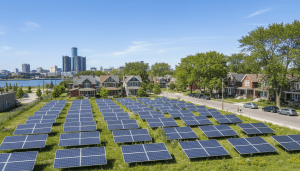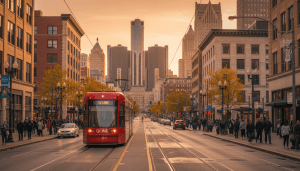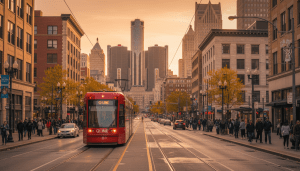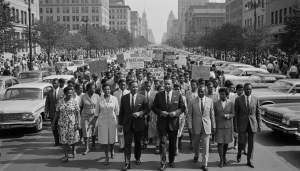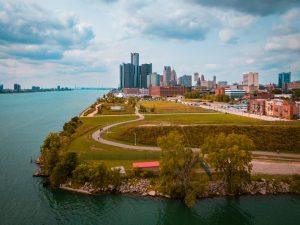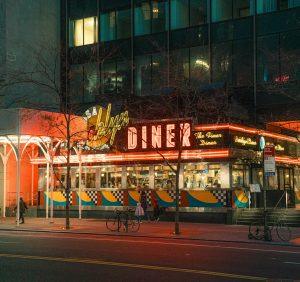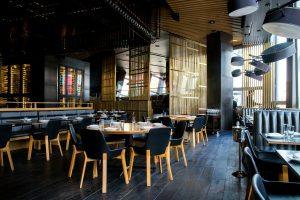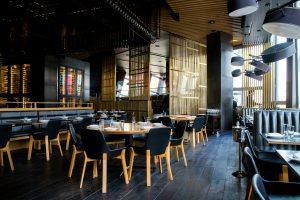Detroit late-night food startups August 2025 are redefining what it means to hustle in the D. While the city’s skyline lights dim after work hours, another economy comes alive—one driven by food trucks, ghost kitchens, and neighborhood eateries that keep Detroiters fueled long past midnight. For founders and workers alike, this isn’t just about satisfying cravings—it’s about jobs, innovation, and building businesses that last.
Why Late-Night Food Is a Big Deal in Detroit
Detroit has always had a culture of grind. Auto shifts run late, creatives keep long hours, and college students around Wayne State and Midtown are looking for affordable, fast food options after dark. Traditional restaurants have limited hours, leaving a huge demand gap. Entrepreneurs recognized this and stepped in—creating startups that cater specifically to the night crowd.
From Corktown taco trucks to ghost kitchens in Southwest Detroit, these businesses combine Detroit grit with food innovation. They offer online ordering, delivery through apps, and even subscription meal packages for night-shift workers. That demand isn’t small—industry watchers say the after-hours food economy in metro Detroit could be worth tens of millions annually by 2026.
Food Trucks, Ghost Kitchens, and Side Hustles
Food trucks remain the backbone of late-night eats. Startup operators park outside bars, clubs, and music venues, serving everything from halal street food to Detroit-style coneys until 3 a.m.
Ghost kitchens—delivery-only restaurants operating from shared spaces—have exploded. Many young Detroit founders are using these as low-overhead ways to test menus before opening storefronts.
Side hustles turned serious. Plenty of entrepreneurs started with small Instagram-based food sales and now manage multiple employees thanks to growing demand.
These models in Detroit late-night food startups August 2025 – allow Detroiters with small budgets to scale quickly, turning food passions into employment engines.
Jobs Created by the Late-Night Economy
Late-night food startups aren’t just tasty—they’re job creators. Each truck or kitchen usually employs cooks, delivery drivers, social media managers, and part-time staff. Some businesses hire DJs or promoters to pair food with vibe, pulling double duty as cultural hubs.
Estimates suggest that since 2022, over 1,000 Detroiters have found steady or part-time jobs tied directly to late-night food ventures. With new funding sources like micro-loans and startup incubators focused on hospitality, that number is set to climb.
Tech Meets Food: Detroit’s Innovation Edge
Detroit’s startup energy isn’t limited to mobility and AI—it’s in food, too. Many late-night operators use AI-driven inventory tracking, digital ordering apps, and even data analytics to find hotspots. By analyzing foot traffic near concert venues or Wayne State campus housing, they know exactly where to park or which menu items will sell best.
Partnerships with local breweries and distilleries have also created cross-promotion opportunities. Imagine a brewery in Eastern Market collaborating with a taco ghost kitchen: one makes the drinks, the other the food, both win.
Challenges of Running a Nighttime Startup
Of course, the hustle isn’t all smooth:
Licensing & permits: Detroit requires multiple food safety and vending permits, and until recent reforms, these slowed down startups by months.
Safety & staffing: Operating late at night means security issues and high staff turnover.
Competition: As more entrepreneurs enter the late-night game, standing out requires constant creativity.
Despite this, the success stories outweigh the risks. Owners who adapt with strong branding, digital presence, and consistent quality often find themselves expanding into multiple trucks or storefronts.
What It Means for Detroit’s Startup Ecosystem
The rise of late-night food ventures demonstrates Detroit’s broader entrepreneurial momentum. Just as mobility startups are putting the city on the tech map, food startups are proving that passion-driven, small-scale ventures can fuel job growth and community pride. These businesses represent the city’s mix of grit, creativity, and cultural depth.
For young Detroiters, late-night food entrepreneurship is a gateway into business ownership. It’s often cheaper to launch than a retail shop, faster to gain traction, and easier to pivot based on feedback. That flexibility fits perfectly into Detroit’s resilient DNA.
Detroit late-night food startups August 2025
are more than a trend—they’re an engine of growth, community, and innovation. From taco trucks in Corktown to ghost kitchens feeding Midtown’s students, these businesses keep Detroit awake, employed, and inspired. They show that the Motor City’s hustle doesn’t clock out—it just switches shifts. For anyone dreaming of entrepreneurship, the after-hours economy is proof: Detroit has space, appetite, and opportunity for you to build.


